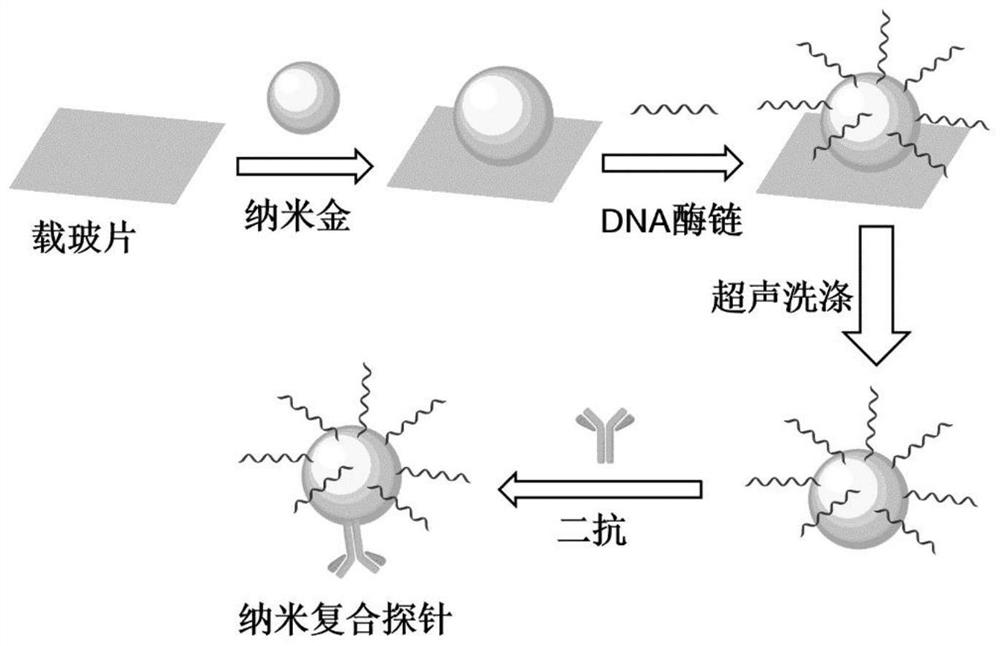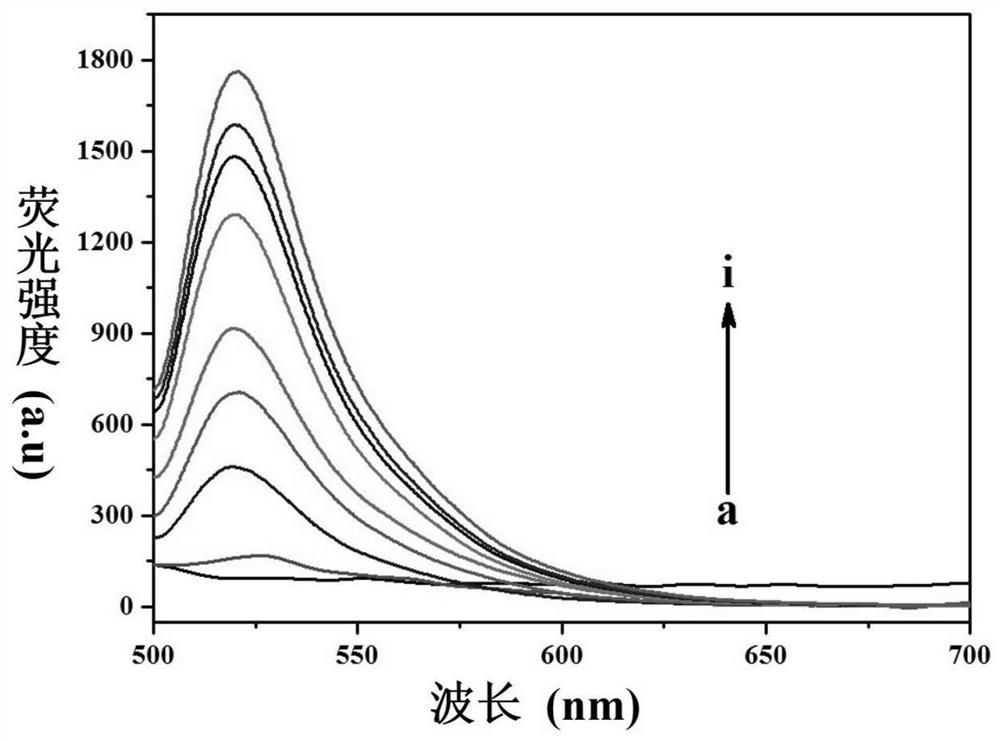A nanocomposite probe, composition and fluorescence quantitative kit for highly sensitive fluorescent quantitative detection of serum tumor markers
A technology for fluorescent quantitative detection and tumor markers, applied in the field of fluorescent quantitative detection, can solve the problems of complex operation, low content of tumor markers, short storage time of reagents, etc., achieve high catalytic activity, improve sensitivity and specificity, and improve sensitivity Effect
- Summary
- Abstract
- Description
- Claims
- Application Information
AI Technical Summary
Problems solved by technology
Method used
Image
Examples
preparation example Construction
[0042] The nanocomposite probe containing a large amount of DNase chains and a small amount of serum tumor marker secondary antibody to be detected can be obtained by adopting the preparation sequence described in the present invention, so that the probe is rich in a large amount of DNase chains, shortening the reaction time and rapidly amplifying Fluorescent signal for high sensitivity detection.
[0043] Specifically, the nanocomposite probe of the present invention is prepared according to the following steps:
[0044] S1, modifying gold nanoparticles by asymmetric modification with DNA enzyme chains to obtain gold nanoparticles-enzyme chains;
[0045] S2. Mix the secondary antibody of the serum tumor marker to be detected with the gold nanoparticle-enzyme chain obtained in step S1 for asymmetric modification to obtain a nanocomposite probe.
[0046] In the present invention, the DNA enzyme chain is modified on the surface of the gold nanoparticle by means of asymmetric mo...
Embodiment 1
[0064] The preparation of embodiment 1 nanocomposite probe
[0065] 0.1 mL of tannic acid-coated AuNPs (30nm, 50nM) was drop-coated on a positively charged clean glass slide for 3 hours at room temperature, and the tannic acid-coated AuNPs were adsorbed on the positively charged glass slide by electrostatic adsorption. On the slide, the glass slide appeared lavender, washed with a large amount of ultrapure water, and 100 μL of DNase chain (10 -6 M) Drop coating on a glass slide to asymmetrically modify the AuNPs adsorbed on the glass slide. After reacting for 12 hours, rinse with a large amount of ultrapure water, blow dry with nitrogen, and place the slide in 1.0 mL of ultrapure water for 5 minutes to remove the adsorption of AuNPs and the slide. The solution obtained by sonication was centrifuged to obtain a precipitate (8000r / min, 10min), washed with ultrapure water, and redispersed in 0.1mL of ultrapure water to obtain asymmetrically modified AuNPs-enzyme chains.
[0066...
Embodiment 2
[0068] The preparation of embodiment 2 nanocomposite probes
[0069] 0.1mL of tannic acid-coated AuNPs (30nm, 50nM) was drop-coated on a positively charged clean glass slide for 2.5 hours at room temperature, and the tannic acid-coated AuNPs were adsorbed on the positively charged glass slide by electrostatic adsorption. On the slide, the glass slide appeared lavender, washed with a large amount of ultrapure water, and 100 μL enzyme chain (10 -6 M) Drop coating on a glass slide to asymmetrically modify the AuNPs adsorbed on the glass slide. After reacting for 14 hours, rinse with a large amount of ultrapure water, blow dry with nitrogen, and place the glass slide in 1.0 mL of ultrapure water for 8 minutes to remove the adsorption of AuNPs and the glass slide. The solution obtained by ultrasonication was centrifuged to obtain a precipitate (9000r / min, 8min), which was washed with ultrapure water and redispersed in 0.1mL of ultrapure water to obtain asymmetrically modified AuNP...
PUM
| Property | Measurement | Unit |
|---|---|---|
| particle diameter | aaaaa | aaaaa |
Abstract
Description
Claims
Application Information
 Login to View More
Login to View More - R&D
- Intellectual Property
- Life Sciences
- Materials
- Tech Scout
- Unparalleled Data Quality
- Higher Quality Content
- 60% Fewer Hallucinations
Browse by: Latest US Patents, China's latest patents, Technical Efficacy Thesaurus, Application Domain, Technology Topic, Popular Technical Reports.
© 2025 PatSnap. All rights reserved.Legal|Privacy policy|Modern Slavery Act Transparency Statement|Sitemap|About US| Contact US: help@patsnap.com



